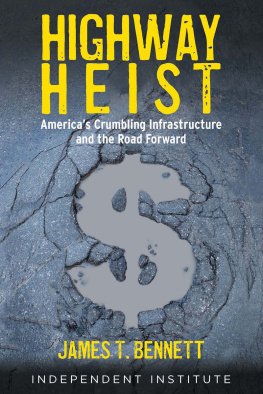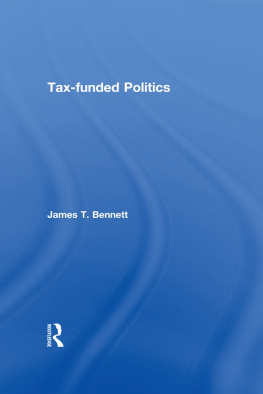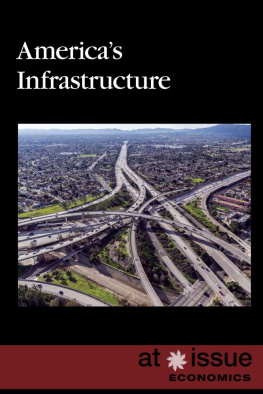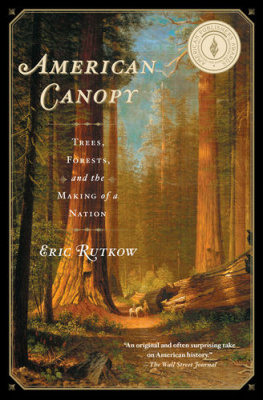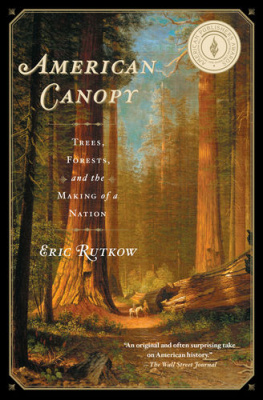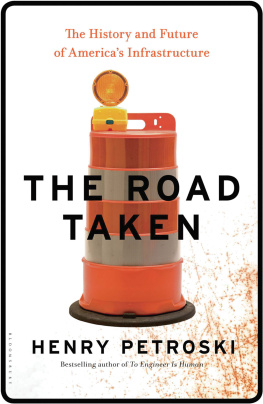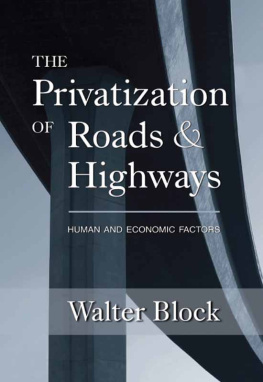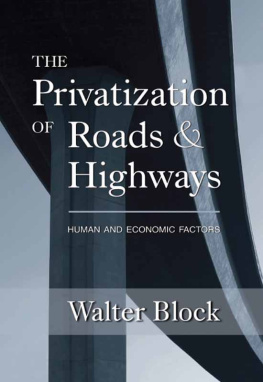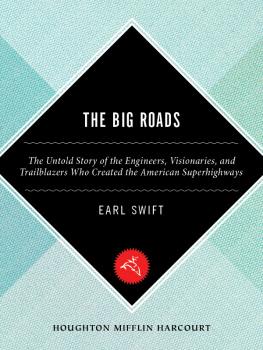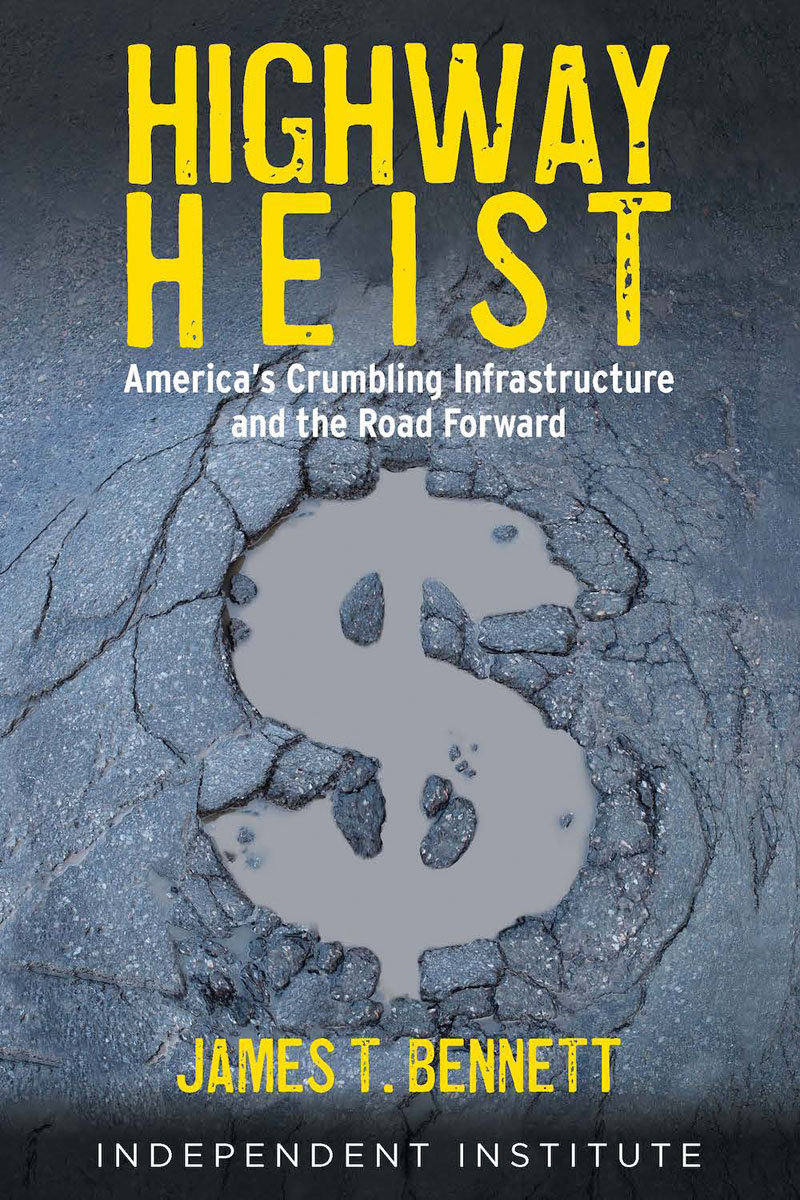

I n this eye-opening book, Professor James Bennett guides readers through centuries of one of the most underrated yet widely used aspects of American life: roads. Relying on history and economic data, and with a humorous and oftentimes sharp tongue, Bennett explains how important Americas highways and byways have been to everything from policymaking to everyday life. Crafting them took persuasion, planning, and more taxes than any politician could have dreamed of. And far too often their realizationthanks, in Bennetts view, to flawed interpretations of the power of eminent domainrequired destruction, sometimes on a massive scale, of long-established neighborhoods and important cityscapes. Likewise, the upkeep of Americas highways has been the center of many a policy battle, waged by Republicans and Democrats alike. We all want roads in good working condition, but just how and who will pay for them remain contentious questions. Bennett argues persuasively that the road forward just might be a second, but more serious, sustained look at, and local experimentation with, private roads and toll roads. Agree or disagree with him, Bennett has written a significant contribution to Americas ongoing debate about how her citizens should traverse, from sea to shining sea, its fruited plain.

Praise for Highway Heist
In Highway Heist, James Bennett provides vital, new, intellectual infrastructure for a timely and authoritative critique of pork barrels, potholes, and political privilege.
George Gilder, bestselling author, Wealth and Poverty, Life After Google, Telecosm, Knowledge and Power, and other books
James Bennetts indispensable book Highway Heist critically examines the corruption, waste, and runaway costs of government transportation infrastructure. He reveals how interest groups have long exploited infrastructure spending policies to enrich themselves while subjecting the public to such recurring failures as traffic congestion, dangerous conditions, crumbling roads and bridges, and pork scandals. Instead of such unnecessary problems from government monopolies, Highway Heist shows the viability of private, market-based, enterprising systems in directly serving transport needs, with real accountability, innovative benefits and enormous savings.
Rand Paul, U.S. Senator; Ranking Member, Senate Committee on Small Business and Entrepreneurship
Whatever your views on highway construction, the remarkable and indispensable book Highway Heist will improve it. Who knew for example that Transportation Secretary John Volpe saved New Orleans French Quarter in the 1970s? This fascinating book could not be timelier as state Departments of Transportation throughout America, keeping social objectives in mind, start ramping up infrastructure spending with new Federal funds.
Diana Furchtgott-Roth, former Deputy Assistant Secretary for Research and Technology, U.S. Department of Transportation; Adjunct Professor, George Washington University
One can never know enough history. From Mancur Olson, we know that given enough time, there will be coalitions that prompt interest-group formation and success. So much for the public interest. From James Bennetts book Highway Heist we now have a very readable and informative complement to Olsons insight, a lively account of how the U.S. highway lobby came to be and what it delivered. The good as well as the bad. We went from muddy roads to the Interstates. And back again. We now have potholed roads in too many places alongside pork projects and congested arteries. Political allocations seemingly end up that way. I cannot think of a better guide to U.S. transportation policy and politics than Highway Heist.
Peter Gordon, Emeritus Professor of Public Policy, University of Southern California; co-editor, The Voluntary City: Choice, Community and Civil Society
James Bennett and the Independent Institute offer a provocative and timely challenge to state and federal policymakers. In the important book Highway Heist, we are treated to both a history lesson of how infrastructure policy has evolved and the key question facing us as we look to the future: Cant a nation of innovators agree upon a better way to build, maintain and pay for necessary internal improvements? Bennett raises all the appropriate questions. Who will be willing to respond and lead?
John M. Engler, former Governor of Michigan; former President and CEO, Business Roundtable
The fascinating and timely book Highway Heist provides a comprehensive account of the economics, politics and history of government infrastructure. A true joy to read, this compelling book vividly shows how real economic, social and environmental progress requires innovative, market-based, entrepreneurial, transportation systems without the cronyism, corruption, boondoggles, profligacy and waste from the interest-group politics of Big Government. Highly recommended!
Peter F. Schweizer, President, Government Accountability Institute; bestselling author, Clinton Cash, Red-Handed, Profiles in Corruption, Secret Empires, and other books
The lively and entertaining book Highway Heist underscores an important rule of thumb: the more government is involved in infrastructure, the more likely it is to be crumbling. The solution, the book clearly shows, is not to spend more government money on infrastructure, but to spend less of our tax dollars and rely instead on user fees and private ownership.
Randal OToole, Director, Thoreau Institute; author, Gridlock: Why Were Stuck in Traffic and What to Do About It and Romance of the Rails: Why the Passenger Trains We Love Are Not the Transportation We Need
Convenient, quality, efficient and inexpensive transportation infrastructure systems are irreplaceable for economic, social and environmental progress. However, the meaning of infrastructure has been twisted politically into a deceptive buzzword to cover up massive and flagrant corruption, pork and waste that Americans are compelled to fund. James Bennetts timely and essential book Highway Heist now vividly exposes how todays government transportation boondoggles have come to dominate, but also how innovative, competitive, private, entrepreneurial systems can and should be adopted. Highway Heist is required reading for policymakers, business and civic leaders, educators and students, and the general public in order to secure our vital transportation needs.
Michael S. Lee, U.S. Senator; Ranking Member, Joint Economic Committee; Member, Senate Committee on Commerce, Science, and Transportation
In Highway Heist, Bennett makes sense of highway provision in America. Alexis de Tocqueville wrote in the 1830s, during the toll-road era, and celebrated local management, including voluntary financing and private management of toll-road companies. That approach continued through much of the 19th century and across the nation. But later the imperious Progressive mentality extended itself throughout public life. Activists for Good Roads showed little concern, Bennett writes, that centralizing the administration of roadwork would drain the lifeblood from the local body politic. That, too, is Tocqueville to a T. American highways have traveled the road that Tocqueville foresaw. Into the 20th century, highways were almost thoroughly governmentalized. The ride up to the present day has been bumpy, but now in
Next page
